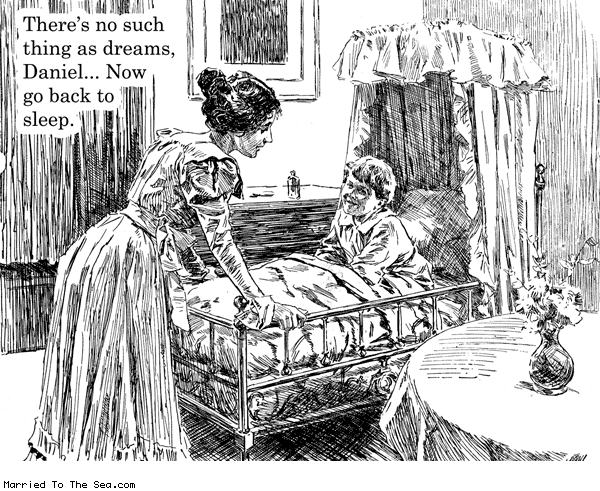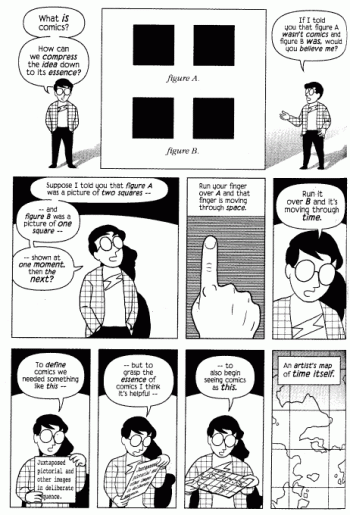Serendip is an independent site partnering with faculty at multiple colleges and universities around the world. Happy exploring!
Literary Kinds

Dealing with Persepolis: Class Notes for Day 20
Dealing with Persepolis:
A few thoughts from the class…
- framework of Persepolis is simple pictures explaining a series of complicated historical events=HELPFUL
-hard to follow plot of Persepolis; different reading experience
-some wanted Persepolis to have colored images like in A Game of You

NYT: "The Next Big Thing"
An article entitled "Next Big Thing in English: Knowing They Know That You Know" asks some interesting questions (broadly, but well).
Here are some snippets that might be particularly pertinent:
"The brain may be it. Getting to the root of people’s fascination with fiction and fantasy, Mr. Gottschall said, is like “mapping wonderland.”"

Child's Eye View
I'll start by saying I absolutely loved "Persepolis," and it was one of the best things I've read in awhile.
One of my favorite things about "Persepolis" was that it told the story of something very complicated through the simple view of a child. It could have just been like any history book on the war and revolution that took place in Iran that's ever been written, but instead it's brought to life through the illustrations and through the telling of the story through the eyes of a child. The reader learns about revolution and all that goes into it along with Marji, which for me was very enjoyable. I never thought I would enjoy graphic novels, but because of "Persepolis" they may be starting to grow on me.

I can't believe they belong to the same genre
As someone who has never read Persepolis I was completely shocked once I did finish the novel. My exact words were “well, that was not what I thought it would be”. It feels idiotic to admit but before I even read a page I thought less of the graphic narrative because of the simplicity of the pictures. I assumed that because it was so popular worldwide, unlike A Game of You, that the narrative would not be difficult to follow or the topic would just follow the life of a person in a foreign country, nothing too heavy. I will NEVER make that assumption again. Persepolis was an entirely different graphic narrative than A Game of You and in turn provided a new reading experience. I loved reading A Game of You and I adored to colorful and intricate drawings.
why do I love words?
Anne's point-blank question got me thinking today in class- why do I prefer words over images? I came up with the following answers to the query: I thoroughly enjoy the work that it takes to understand language. The thrill I get out of word analysis and even further, close reading, is unlike what I feel when I look at a picture, with all the details laid out for me. Little work is involved here: also, the room for interpretation is relatively small. Where's the thrill in that? I feel like drawings are like answers are given to you; hardly any effort or interpretation required! Pictures result in immediate comprehension, while words result in a journey to understanding. I love this journey!
A Gender Gap?
Today in class got me thinking a little bit more about the instantaneous perception of images in graphic novels. A point not brought up today was that of gender. Men and women think differently. So, what if gender made a difference in the immediacy of image perception? Are men more visual, thus making pictures easier for them to read--more easy for them to understand? This would follow the same line of thought that women are more complicated. Maybe the complicated nature of a woman can partly explain our dependence on words..? Unfortunately we don't have any males in our class to tell us if THEY thought the images in A Game of You were more immediately helpful than the words....I think this would be an interesting concept to pursue.
Text Message Follow-Up
Text message conversation, properly capitolized and with added punctuation for your reading pleasure:
aseidman: What is so undignified about thought bubbles? Prof Dalke asked.
Dave Joria: Because our natural state of being is to know only one person's thoughts at a time. Captions are normally stuck to one person and are more contemplative.
aseidman: So, it's all about making it a more realistic experience? Pithy!
Dave Joria: You realize that you are being graded in this class, not me. Right?
aseidman: But you have such brilliant things to say.
Dave Joria: Flattery, on the other hand, will get you everywhere.

words and images: class notes 3/30/10
We opened with the introduction of aseidman's friend Dave Joria, who writes comics as part of the group Tangent Artists.
We looked at an image from the Dream Suite; Anne thought it was interesting to see visuals generating other visuals.
Anne also brought up Restless—it's based on data on diversity issues at BMC, and featured a professor character who had a second-self subconscious/private self/“electric subconscious”.
undefined
I think Persepolis may be the first thing I've really, really enjoyed reading in a while; I read it all in one shot. I really liked the simplicity of the style and never found myself reading the words instead of looking at the pictures, even though I am drawn to words like many of the people in our class. A Game of You made me realize that reading graphic novels may not always be a quick process, but even though Persepolis is a lot thicker, I think I got through it more quickly. There seemed to be less text on each page.

Thinking about Dreams
“Yet such a definition may perhaps be reached by considering the points of difference between reality and its opposite, fiction. A figment is a product of somebody's imagination; it has such characters as his thought impresses upon it. That those characters are independent of how you or I think is an external reality. There are, however, phenomena within our own minds, dependent upon our thought, which are at the same time real in the sense that we really think them. But though their characters depend on how we think, they do not depend on what we think those characters to be.

This reminded me
Married to the Sea (the website where this comic is from) is a web comic that I look at daily. It's not a typical comic in that it doesn't follow a story line--every day there's just a different drawing with words, and the one for today reminded me of what we've been doing in class lately.


revising my one-word response to "A Game of You"
“The axis of reality runs solely through the egotistic places,- they are strung upon it like so many beads.” William James

Reactions to Graphic Novels(03/30)
Today's class began with a Kim Nortrop picture and our usual course keeping. The class discussed the recent paper topics which ranged form liquid connection to adaptations of Alice. Anne was surprised at how well the papers were written considering the lack of conferences and although she tried a new method of commenting on the papers she said she will probably not do that format again.

how do we read?
A broad question, but important, I think for what we are looking at. I guess I started thinking (too much?) about Anne Dalke's question to me: did I have any expectations/answers of my own for how to read graphic novels? I think I need to change my no to a yes, or at least a hesitant yes with a very vague answer.
I was really delighted today to learn so much about graphic novels, especially the actual process, and how close they really come to movies. Also, the debate of whether pictures are 'received' more than 'perceived' --part of me wants to read the Scott McCloud books Right Now and Understand What He Means, but that probably won't happen immediately, so... instead, I am excited for the debate to continue in class.

The Form of a Webcomic
In class today we briefly discussed the forms that comics can take (and webcomics because they are not limited to print). Dave quoted Scott Mccloud, so I think it would be appropriate to "quote" him first on time and form in comics:

Then on time and form in web comics: I Can't Stop Thinking! #4

Speaking of dreams...
Neil Gaiman's "A Game of You" and Alice's Adventures in Wonderland were both works that were very dream-centric. I read some posts that talked about movies centering on dreams, and I thought of a couple of movies I've seen that rely completely on the principle of dreams.
Tangent Artists
Tomorrow in class, we're going to briefly have a guest speaker. Dave Joria is one of the writers for the semi-professional artist group, "Tangent Artists," most recently to be seen selling their comics "Skeleton Crew" and "Donuts for Looking" at Katsucon. He'll be talking a bit about his work on "Skeleton Crew," a webcomic which you can find at http://www.tangentartists.com/skeletoncrew/skeletoncrew_000.html if you're interested in checking it out before class.


